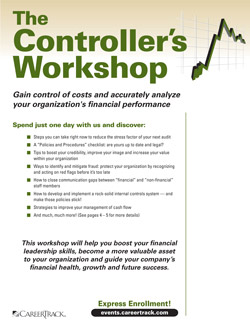Behind every successful organization, there's a great financial manager …
Your job as your organization's controller means that it's up to you to juggle people, projects, finances, budgets, and purchases … not to mention other critical duties like staying on top of state and federal regulatory agency requirements, providing complex financial data at a moment's notice, and overseeing the financial policies and direction of your organization.
Managers, CEOs, CFOs, investors, and company stakeholders — all depend on the accurate financial data, forecasting, analysis, and reporting that controllers provide.
How can you work more effectively? Do your job more efficiently? How do other controllers at some of today's largest organizations manage their myriad of responsibilities (while keeping their sanity!)? What are the latest and greatest "best practices" you can adopt to make your own job easier?
The Controller's Workshop is an intensive, fast-paced look at how to improve your day-to-day job performance by working smarter — not harder or longer (you already put in enough hours in a day!). You'll discover an incredible amount of information, ideas, how-to's, and tools for improving your accounting team's performance, enhancing your financial reporting skills, maintaining successful internal controls, monitoring cash flow, controlling costs and much more.
<!--read more-->
Join your peers for a powerful day of results-focused learning!
This workshop is a golden opportunity for you to join other controllers who share your on-the-job responsibilities, challenges, triumphs, and frustrations. It's a day designed to deliver the training you need to streamline your processes and procedures, explore new ideas and strategies for improving productivity, and become a more effective leader, manager, and communicator.
Keep your finger on the financial pulse of your organization
As the driving force behind your organization's financial performance, it's up to you to develop and maintain the systems, policies, and procedures that ensure accurate reporting, analysis, evaluations, and asset management. The Controller's Workshop will help you:
- Evaluate your current accounting policies and procedures, and revise them if necessary
- Establish an effective internal controls framework
- Use forecasting tools to create a more accurate financial picture
- Utilize pricing models to price products and services
- Accurately track costs to maintain optimum cash flow
- Quickly identify and mitigate fraud within your organization
Your business looks to you for financial leadership. This intensive workshop will help you tackle a broad range of financial issues head on, from monitoring controls and cash flow to advising upper management on purchases, hiring, expansion, and other areas that are directly affected by financial performance.
